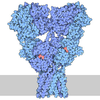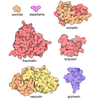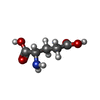[English] 日本語
 Yorodumi
Yorodumi- PDB-2i3v: Measurement of conformational changes accompanying desensitizatio... -
+ Open data
Open data
- Basic information
Basic information
| Entry | Database: PDB / ID: 2i3v | ||||||
|---|---|---|---|---|---|---|---|
| Title | Measurement of conformational changes accompanying desensitization in an ionotropic glutamate receptor: Structure of G725C mutant | ||||||
 Components Components | Glutamate receptor 2 | ||||||
 Keywords Keywords | MEMBRANE PROTEIN / Ionotropic glutamate receptor ligand binding core S1S2 G725C mutant | ||||||
| Function / homology |  Function and homology information Function and homology informationspine synapse / dendritic spine neck / dendritic spine cytoplasm / cellular response to amine stimulus / dendritic spine head / perisynaptic space / Activation of AMPA receptors / ligand-gated monoatomic cation channel activity / AMPA glutamate receptor activity / Trafficking of GluR2-containing AMPA receptors ...spine synapse / dendritic spine neck / dendritic spine cytoplasm / cellular response to amine stimulus / dendritic spine head / perisynaptic space / Activation of AMPA receptors / ligand-gated monoatomic cation channel activity / AMPA glutamate receptor activity / Trafficking of GluR2-containing AMPA receptors / response to lithium ion / AMPA glutamate receptor clustering / cellular response to glycine / kainate selective glutamate receptor activity / AMPA glutamate receptor complex / immunoglobulin binding / asymmetric synapse / regulation of receptor recycling / extracellularly glutamate-gated ion channel activity / ionotropic glutamate receptor complex / conditioned place preference / Unblocking of NMDA receptors, glutamate binding and activation / glutamate receptor binding / positive regulation of synaptic transmission / regulation of synaptic transmission, glutamatergic / response to fungicide / cytoskeletal protein binding / extracellular ligand-gated monoatomic ion channel activity / cellular response to brain-derived neurotrophic factor stimulus / glutamate-gated receptor activity / regulation of long-term synaptic depression / somatodendritic compartment / glutamate-gated calcium ion channel activity / presynaptic active zone membrane / dendrite membrane / excitatory synapse / ionotropic glutamate receptor binding / ionotropic glutamate receptor signaling pathway / dendrite cytoplasm / ligand-gated monoatomic ion channel activity involved in regulation of presynaptic membrane potential / synaptic membrane / positive regulation of excitatory postsynaptic potential / dendritic shaft / SNARE binding / PDZ domain binding / synaptic transmission, glutamatergic / protein tetramerization / establishment of protein localization / transmitter-gated monoatomic ion channel activity involved in regulation of postsynaptic membrane potential / cerebral cortex development / postsynaptic density membrane / receptor internalization / modulation of chemical synaptic transmission / Schaffer collateral - CA1 synapse / terminal bouton / synaptic vesicle / long-term synaptic potentiation / synaptic vesicle membrane / signaling receptor activity / amyloid-beta binding / presynapse / growth cone / presynaptic membrane / scaffold protein binding / dendritic spine / chemical synaptic transmission / perikaryon / postsynaptic membrane / neuron projection / postsynaptic density / axon / external side of plasma membrane / neuronal cell body / synapse / dendrite / protein kinase binding / protein-containing complex binding / glutamatergic synapse / cell surface / endoplasmic reticulum / protein-containing complex / identical protein binding / membrane / plasma membrane Similarity search - Function | ||||||
| Biological species |  | ||||||
| Method |  X-RAY DIFFRACTION / X-RAY DIFFRACTION /  SYNCHROTRON / SYNCHROTRON /  MOLECULAR REPLACEMENT / Resolution: 2.4 Å MOLECULAR REPLACEMENT / Resolution: 2.4 Å | ||||||
 Authors Authors | Armstrong, N. / Jasti, J. / Beich-Frandsen, M. / Gouaux, E. | ||||||
 Citation Citation |  Journal: Cell(Cambridge,Mass.) / Year: 2006 Journal: Cell(Cambridge,Mass.) / Year: 2006Title: Measurement of Conformational Changes accompanying Desensitization in an Ionotropic Glutamate Receptor. Authors: Armstrong, N. / Jasti, J. / Beich-Frandsen, M. / Gouaux, E. #1: Journal: Protein Sci. / Year: 1998 Title: Probing the ligand binding domain of the GluR2 receptor by proteolysis and deletion mutagenesis defines domain boundaries and yields a crystallizable construct Authors: Chen, G.Q. / Sun, Y. / Jin, R. / Gouaux, E. | ||||||
| History |
| ||||||
| Remark 999 | SEQUENCE THE PROTEIN CRYSTALLIZED BY THE AUTHOR IS THE EXTRACELLULAR LIGAND BINDING DOMAIN OF GLUR- ...SEQUENCE THE PROTEIN CRYSTALLIZED BY THE AUTHOR IS THE EXTRACELLULAR LIGAND BINDING DOMAIN OF GLUR-2. TRANSMEMBRANE REGIONS WERE GENETICALLY REMOVED AND REPLACED WITH A GLY-THR LINKER. THE SEQUENCE, AS A RESULT, MATCHES DISCONTINUOUSLY WITH THE REFERENCE DATABASE. |
- Structure visualization
Structure visualization
| Structure viewer | Molecule:  Molmil Molmil Jmol/JSmol Jmol/JSmol |
|---|
- Downloads & links
Downloads & links
- Download
Download
| PDBx/mmCIF format |  2i3v.cif.gz 2i3v.cif.gz | 213.8 KB | Display |  PDBx/mmCIF format PDBx/mmCIF format |
|---|---|---|---|---|
| PDB format |  pdb2i3v.ent.gz pdb2i3v.ent.gz | 172.4 KB | Display |  PDB format PDB format |
| PDBx/mmJSON format |  2i3v.json.gz 2i3v.json.gz | Tree view |  PDBx/mmJSON format PDBx/mmJSON format | |
| Others |  Other downloads Other downloads |
-Validation report
| Arichive directory |  https://data.pdbj.org/pub/pdb/validation_reports/i3/2i3v https://data.pdbj.org/pub/pdb/validation_reports/i3/2i3v ftp://data.pdbj.org/pub/pdb/validation_reports/i3/2i3v ftp://data.pdbj.org/pub/pdb/validation_reports/i3/2i3v | HTTPS FTP |
|---|
-Related structure data
| Related structure data |  2i3wC 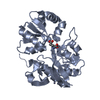 1ftjS S: Starting model for refinement C: citing same article ( |
|---|---|
| Similar structure data |
- Links
Links
- Assembly
Assembly
| Deposited unit | 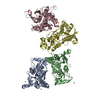
| ||||||||
|---|---|---|---|---|---|---|---|---|---|
| 1 | 
| ||||||||
| 2 | 
| ||||||||
| 3 | 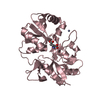
| ||||||||
| 4 | 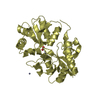
| ||||||||
| 5 |
| ||||||||
| 6 | 
| ||||||||
| 7 | 
| ||||||||
| 8 | 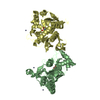
| ||||||||
| Unit cell |
|
- Components
Components
| #1: Protein | Mass: 28995.516 Da / Num. of mol.: 4 / Fragment: LIGAND BINDING CORE (S1S2J) Source method: isolated from a genetically manipulated source Source: (gene. exp.)   #2: Chemical | ChemComp-ZN / #3: Chemical | ChemComp-GLU / #4: Water | ChemComp-HOH / | Has protein modification | Y | |
|---|
-Experimental details
-Experiment
| Experiment | Method:  X-RAY DIFFRACTION / Number of used crystals: 1 X-RAY DIFFRACTION / Number of used crystals: 1 |
|---|
- Sample preparation
Sample preparation
| Crystal | Density Matthews: 2.78 Å3/Da / Density % sol: 55.81 % |
|---|---|
| Crystal grow | Temperature: 277 K / pH: 6.5 Details: 0.1 M CACODYLATE, 18% PEG 8000, 0.2 M ZINC ACETATE, pH 6.5, VAPOR DIFFUSION, HANGING DROP, temperature 277K, pH 6.50 |
-Data collection
| Diffraction | Mean temperature: 100 K |
|---|---|
| Diffraction source | Source:  SYNCHROTRON / Site: SYNCHROTRON / Site:  NSLS NSLS  / Beamline: X4A / Wavelength: 1 / Beamline: X4A / Wavelength: 1 |
| Detector | Type: ADSC QUANTUM 210 / Detector: CCD / Date: Jun 24, 2004 / Details: MIRRORS |
| Radiation | Monochromator: SI 111 CHANNEL / Protocol: SINGLE WAVELENGTH / Monochromatic (M) / Laue (L): M / Scattering type: x-ray |
| Radiation wavelength | Wavelength: 1 Å / Relative weight: 1 |
| Reflection | Resolution: 2.4→20 Å / Num. obs: 49920 / % possible obs: 90 % / Observed criterion σ(I): 0 / Redundancy: 4.8 % / Biso Wilson estimate: 58 Å2 / Rmerge(I) obs: 0.061 / Rsym value: 0.058 / Net I/σ(I): 24.5 |
| Reflection shell | Resolution: 2.4→2.49 Å / Redundancy: 4 % / Rmerge(I) obs: 0.288 / Mean I/σ(I) obs: 2.6 / Rsym value: 0.352 / % possible all: 91 |
- Processing
Processing
| Software |
| ||||||||||||||||||||||||||||||||||||||||||||||||||||||||||||||||||||||||||||||||
|---|---|---|---|---|---|---|---|---|---|---|---|---|---|---|---|---|---|---|---|---|---|---|---|---|---|---|---|---|---|---|---|---|---|---|---|---|---|---|---|---|---|---|---|---|---|---|---|---|---|---|---|---|---|---|---|---|---|---|---|---|---|---|---|---|---|---|---|---|---|---|---|---|---|---|---|---|---|---|---|---|---|
| Refinement | Method to determine structure:  MOLECULAR REPLACEMENT MOLECULAR REPLACEMENTStarting model: PDB ENTRY 1FTJ Resolution: 2.4→20 Å / Rfactor Rfree error: 0.006 / Data cutoff high absF: 832648.53 / Data cutoff low absF: 0 / Isotropic thermal model: RESTRAINED / Cross valid method: THROUGHOUT / σ(F): 0 / Stereochemistry target values: ENGH & HUBER
| ||||||||||||||||||||||||||||||||||||||||||||||||||||||||||||||||||||||||||||||||
| Solvent computation | Solvent model: FLAT MODEL / Bsol: 38.36 Å2 / ksol: 0.32 e/Å3 | ||||||||||||||||||||||||||||||||||||||||||||||||||||||||||||||||||||||||||||||||
| Refine analyze |
| ||||||||||||||||||||||||||||||||||||||||||||||||||||||||||||||||||||||||||||||||
| Refinement step | Cycle: LAST / Resolution: 2.4→20 Å
| ||||||||||||||||||||||||||||||||||||||||||||||||||||||||||||||||||||||||||||||||
| Refine LS restraints |
| ||||||||||||||||||||||||||||||||||||||||||||||||||||||||||||||||||||||||||||||||
| LS refinement shell | Resolution: 2.4→2.55 Å / Rfactor Rfree error: 0.021 / Total num. of bins used: 6
|
 Movie
Movie Controller
Controller



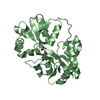

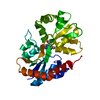
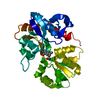
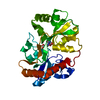
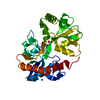


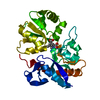
 PDBj
PDBj